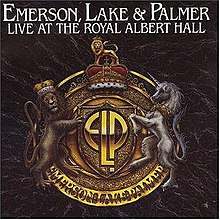Video release
A video version of the concerts was released on DVD, VHS, and LaserDisc in 1996. It has a slightly different running order (closer to the actual setlist for the tour) [7] and contains three songs not included on the CD ("From the Beginning", "Honky Tonk Train Blues" and "Pictures at an Exhibition"), but omits "Still...You Turn Me On" and "Black Moon". In addition, with the exception of "Lucky Man", the video contains different performances of those songs which it has in common with the CD, i.e. wherever the CD used a rendition of a song from one of the Royal Albert Hall concerts, the video used a rendition of the song from the other one.
The original DVD cover shows pictures of the band members, but a reissue in early 2009 by Shout! Factory (who has also reissued much of the band's CD catalog) was changed to match the CD cover. [8]
DVD track listing:
- "Introduction"
- "Karn Evil 9: 1st Impression, Pt. 2"
- "Tarkus"
- "Eruption"
- "Stones of Years"
- "Iconoclast"
- "Knife-Edge"
- "Paper Blood"
- "Creole Dance"
- "From the Beginning" (Lake)
- "Lucky Man"
- "Honky Tonk Train Blues" (Meade Lux Lewis)
- "Romeo and Juliet"
- "Pirates"
- "Pictures at an Exhibition"
- "Promenade" (Modest Mussorgsky, arr. by Emerson)
- "The Gnome" (Mussorgsky, Palmer)
- "Promenade" (Mussorgsky, Lake)
- "The Hut of Baba Yaga" (Mussorgsky, arr. by Emerson)
- "Drum Solo"
- "The Hut of Baba Yaga"
- "The Great Gates of Kiev" (Mussorgsky, Lake)
- "Finale"
- "Fanfare for the Common Man"
- "America"
- "Rondo"
This page is based on this
Wikipedia article Text is available under the
CC BY-SA 4.0 license; additional terms may apply.
Images, videos and audio are available under their respective licenses.
